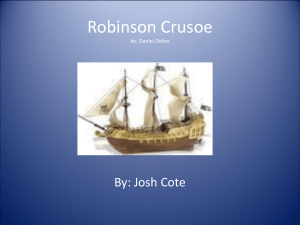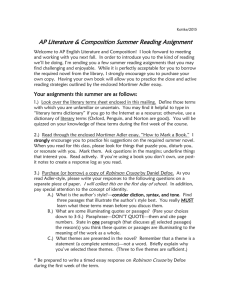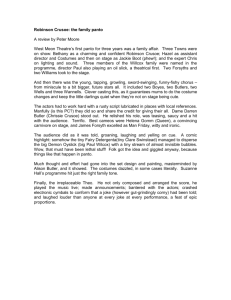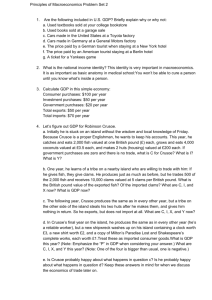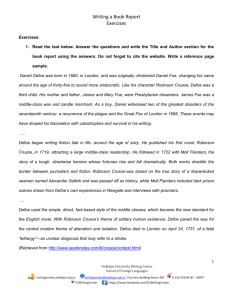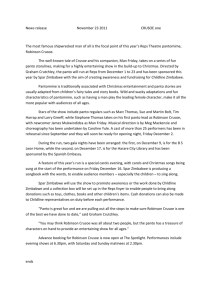Robinson Crusoe
advertisement
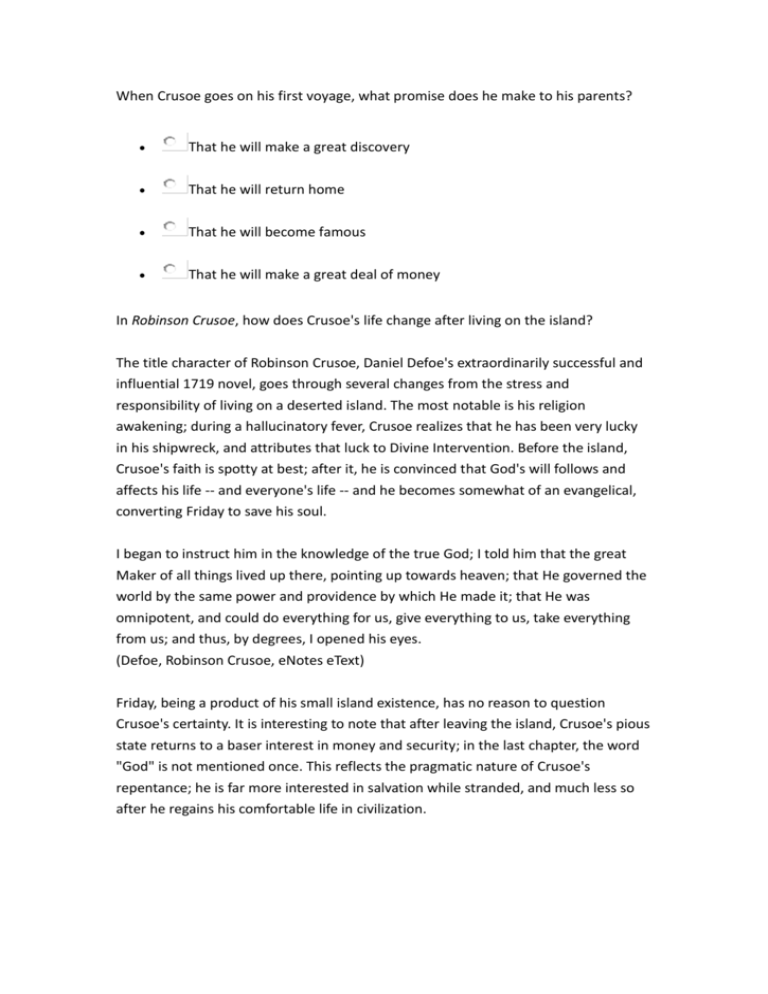
When Crusoe goes on his first voyage, what promise does he make to his parents? That he will make a great discovery That he will return home That he will become famous That he will make a great deal of money In Robinson Crusoe, how does Crusoe's life change after living on the island? The title character of Robinson Crusoe, Daniel Defoe's extraordinarily successful and influential 1719 novel, goes through several changes from the stress and responsibility of living on a deserted island. The most notable is his religion awakening; during a hallucinatory fever, Crusoe realizes that he has been very lucky in his shipwreck, and attributes that luck to Divine Intervention. Before the island, Crusoe's faith is spotty at best; after it, he is convinced that God's will follows and affects his life -- and everyone's life -- and he becomes somewhat of an evangelical, converting Friday to save his soul. I began to instruct him in the knowledge of the true God; I told him that the great Maker of all things lived up there, pointing up towards heaven; that He governed the world by the same power and providence by which He made it; that He was omnipotent, and could do everything for us, give everything to us, take everything from us; and thus, by degrees, I opened his eyes. (Defoe, Robinson Crusoe, eNotes eText) Friday, being a product of his small island existence, has no reason to question Crusoe's certainty. It is interesting to note that after leaving the island, Crusoe's pious state returns to a baser interest in money and security; in the last chapter, the word "God" is not mentioned once. This reflects the pragmatic nature of Crusoe's repentance; he is far more interested in salvation while stranded, and much less so after he regains his comfortable life in civilization. Characters Robinson Crusoe Robinson Crusoe, a self-sufficient Englishman who, after several adventures at sea and on land, is cast away on a small, almost uninhabited island. A practical, farsighted man of talents, he sets about making his island home comfortable, utilizing all his knowledge. His prudence and industry, aided by an imaginative insight, enable him to pass twenty-four years on the island, providing for himself in every way from the resources of the island itself and what he is able to salvage from the shipwreck that puts him in his predicament. A God-fearing man, he reads his Bible and gives thanks each day for his delivery from death. Eventually, he is rescued and returns to England after an absence of thirty-five years, only to go traveling again. Mr. Crusoe Mr. Crusoe, Robinson Crusoe’s father, a middle-class Englishman. He wants his son to go into business and remain at home, rather than go to sea. Friday Friday, a native of a nearby island rescued from cannibal captors by Robinson Crusoe. He proves to be an apt pupil and learns how to participate in his rescuer’s life and labors. He learns to speak English and becomes a friend and companion, as well as a fellow laborer. What do you think about the lack of female characters in Robinson Crusoe? Why are there no females? Robinson Crusoe is a very specific story, having to do with a man who is shipwrecked on an island for 30+ years. Although Defoe does mention Crusoe's parents (including his mother) at the beginning of the tale, as well as a woman at the end who had the handling of his estate should he not return, there simply are not a great many women in this story, and I can't think of any good reasons why there should be. Loosely based on the account of a Scottish sailor who was stranded on an island off the coast of South America, Defoe wrote his story as an adventure as well as of a selfish man coming to terms with what was truly important in his life - the love and mercy of God. think its relevant with the eıghteenth century. Middle class women have to read, entertain themselves and marry, multiply. ıt would be very absurd in thay era to see a woman on an island. and advanture is for males and women' adventures are reading of men made fiction. so Defoe, as selfish as as 18th century gentleman. Robinson repeats himself as a sinner and finds himself in a deserted island. adding a female figure makes him kinda Adam and the story of Genesis comes to mind. he's the king of his world. and there is no need to women. maybe its kinda escaping from the ordinary world for salvation from temptation. even in a patriarchial society, one of the most noticable woman character-captain's widow- helps him by preserving his money.this shows the feminine loyalty again. In "Robinson Crusoe", how did Friday get on the island? In Chapter 22 of the book, Friday and another person are captives of the cannibals who evidently come to the island to have their festivities and then leave by canoe. One victim is killed, and the other, Friday, runs in the direction of Crusoe's fortress. Crusoe had previously had a dream of this very eventuality some time earlier and is surprised that it is playing out in front of him. He convinces the victim that he is friendly, kills two cannibals who are pursuing the victim, and helps Friday hide in his cave. Friday then claims loyalty forever to Crusoe. Can anyone can help me analyse the character of Crusoe with examples? There are several character traits which make Robinson Crusoe, the narrator, an interesting character. First of all, he goes against the conventions of his society and his family by taking to the sea. His family was middle class and would have imagined a different kind of lifestyle for him. As the son of a middle class family, an education and later a job in business would have been more expected. Another character trait is that he is not initially brave or courageous. This helps the reader identify with him. Through the narrative, Crusoe tests his own strength and grows as a person. He must learn how to deal with his loneliness and his fear. Because he is a product of civilization, he is not prepared to deal with the harsh reality of his situation. He must learn how to make weapons and procure food for himself. The fact that he can do this shows us his intelligence and his ingenuity. At the end of the novel, he has become the hero and the most knowledgeable. The reader sees this progression of helpless shipwrecked man to hero as he saves a crew and its mutineers from cannibals and eventually arrives back in Europe Robinson Crusoe Lesson Plans preview Robinson Crusoe Teaching Unit A teaching unit and individual learning packet from Prestwick House. Includes the following: comprehensive chapter-by-chapter study guides for students; questions suitable for essay topics or... More » Excerpts from this unit: •Explain how Robinson Crusoe’s life experience contributes to his survival on the island. •Why is this novel universally appealing? •Discuss the development of Robinson’s spirituality. •Discuss the transformation of Robinson Crusoe as an individual and identify the turning point for him. •Why are people fascinated with characters that are involuntarily removed from civilization? What elements of this type of story create the most curiosity? ... Read Less •Discuss whether Crusoe is truly capable of having the father-son relationship that he claims to have with Friday. Cite incidents that either prove or disprove your theories. •Evaluate Robinson Crusoe’s readiness to judge his guests and prisoners on the island. •Discuss the aspects of the novel that reflect the life of Daniel Defoe. •Explain whether Robinson Crusoe is a hero or not. What events make him a hero? What does he lack to be a hero? •Discuss how Robinson might be different in this novel if he is denied the opportunity to salvage items from his ship and must begin his secluded life with nothing. Question 1 - Robinson Crusoe Overview How many years have passed when Crusoe finally returns to England? 5 12 28 36 Robinson Crusoe Chapter Summaries Chapter 1 My Bad Luck Begins Chapter 2 How I Got To Brazil Class Name Robinson Crusoe Author Biography Daniel Defoe was born in 1660 in Cripplegate, just outside the walls of the City of London. His parents, James and Alice Foe, were Dissenters— Protestants who refused to accept the authority of the Anglican Church (also known as the Church of England). In 1670 Defoe's mother died and he was sent to boarding school. He attended Charles Morton's academy at Newington Green, where he received an excellent education and developed a taste for political radicalism. Defoe finished his studies al Morton in 1679 and entered the hosiery business. In 1684 he married Mary Tuffley. a wealthy young woman. He prospered in business and became a member of the Butcher's Company—one of several companies that controlled business in London, He also gained several influential friends in the government. Robinson Crusoe Introduction Daniel Defoe's The Life and Strange Surprising Adventures of Robinson Crusoe was published as a fictional memoir in 1719. It was so commercially successful that he quickly wrote a sequel. Realizing that fake autobiographies made a good profit, Defoe wrote four more first-person narratives before 1724, The best known are Moll Flanders (1722), A Journal of the Plague Year (1722), and The Fortunate Mistress, or Roxana (1724). Today Robinson Crusoe remains a popular adventure narrative. In fact, the book gave rise to the "Robinsonade," adventure tales that rework the structural elements of Crusoe's island tale. Moreover, the character of Robinson Crusoe is recognized as a literary and cultural icon, like Don Quixote, Don Juan, and Faust; the story of a man stuck on a deserted island has become familiar to nearly everyone in the Western world.
